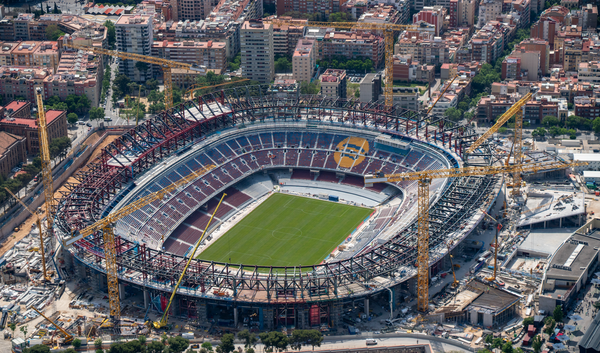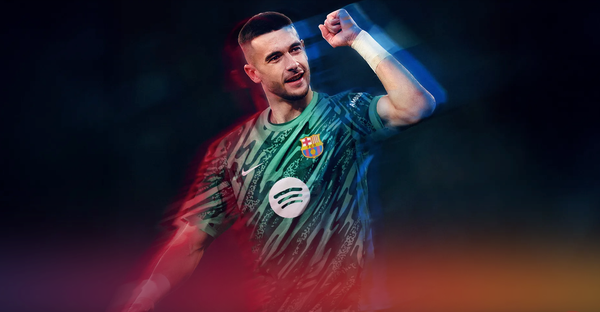The truth behind Barcelona's triumphant transfer window
Barca are still in the red. But they sold some future assets to give the squad a decent facelift which papers over the cracks for now. This is by no means an escape.

Hi, I’m Pablo Woolls-Blanco. A sports journalist who specialises in topics surrounding FC Barcelona. Today, I will be discussing the hot topic of this summer’s transfer window - Barcelona’s finances. Much debate has sprung up surrounding the success Barcelona have had in the most recent transfer market, and due to the club’s very public financial struggles, this is a topic that needs clear context and explanation. For me, it is a pleasure to write on this site, and I hope you all thoroughly enjoy the piece. If you want to keep posted on my journalistic movements, then feel free to head over to my Twitter, and drop me a follow over there: @PabloWBOfficial.
Robert Lewandowski, Raphinha, Jules Koundé, and much more. How could Barcelona, a club in reportedly €1.3BN debt, with losses of up to €550M last season, dominate the transfer market and sign so many world-class players? Not long ago the club had to show the back door to their greatest ever player, Lionel Messi, so how come Barcelona have been unbeatable in the transfer market, with all of Europe’s most notorious stars desperate to move to Cataluña? Understanding Barcelona’s financial situation is perhaps as complicated as things can get for the ‘mere-mortal’ football fan, yet judging by reactions from managers, presidents and even reputable sports journalists, this topic needs explaining - clearly and properly. This article will dissect how Barcelona have been able to spend a fair amount of cash this summer and bring in so many world class players, despite the club’s very public financial struggles.
Bartomeu’s disastrous mismanagement
First, let’s add some very relevant context to this discussion. How can Barcelona even be in such a woeful state financially in the first place? They had Messi, Neymar and Suárez scoring shed-loads of goals every game, operating in the best team in the world under Luis Enrique. In 2019, former president, Josep Maria Bartomeu, famously boasted about Barcelona being the first club to achieve a revenue of €1BN. Surely no financial problems there right? Well, no. In very short terms, it was Bartomeu’s disastrous mismanagement of Barcelona that is the main cause of this horrendous financial mess. Bartomeu believed that because the club was making so much money, he could just aimlessly splash as much cash around as he possibly wanted, with no repercussions. The former president spent lavishly in the transfer market, famously squandering €140M on Philippe Coutinho and €105M on Ousmane Dembélé, following Neymar’s historic €222M departure to PSG in 2017. In the summer of 2019, Bartomeu spent a further €120M on Antoine Griezmann. Past these extortionate transfer fees, perhaps Bartomeu’s gravest error was the insanely out of market wages he gave to his Barcelona stars. With the president weakly succumbing to any request of Jorge Messi (Lionel Messi’s father), he began to hand out unbelievable contracts to the likes of Gerard Piqué, Luis Suárez, Antoine Griezmann, Frenkie de Jong and pretty much anyone who wanted one. Because of just how much Messi was earning, players such as Piqué weren’t just going to sit on €10M net a year. They wanted more, and that’s what they got – a lot more. Not only were these contracts huge in sum, they also increased year by year, coincidently, with several of the players' contracts massively increasing around 2021, when Bartomeu knew his term as president would be over. Still to this day, Barcelona are set to owe hundreds of millions to Gerard Piqué, Sergio Busquets and Frenkie de Jong when their Barcelona contracts expire.
But at the time, no one made much of these deals. Because well, why would they? Barcelona were winning on the pitch, and winning quite big in all truth, with Messi consistently scoring 50 goals a season and delivering relentless silverware into Bartomeu’s offices. He felt invincible as the club’s president. Then, Covid-19 hit. Barcelona were no longer bringing in €1BN a year. No matches, no fans, no megastores, nothing. The horrors of Bartomeu’s disastrous management were now plain for all to see, and things were far from sustainable. Bartomeu had spent billions, putting Barcelona in huge debt. And the worst part is, considering just how much was spent, he left behind a sorry and declining Barcelona side. His legacy would be dreadful.
Joan Laporta returns
By now, Barcelona’s financial struggles were more than public. Most institutions would have gone under, but not FC Barcelona. In March 2021, Joan Laporta returned to the club for his second stint as president, following winning the club’s presidential elections. It’s fair to say things went very well the first time around. As Barcelona president, Laporta is the opposite to Bartomeu. Straight away, he knew work needed to be done, and pretty severe work too. Barcelona were in debt – big debt. So, one of the first things the new president did in his second term at the club was restructure that debt. What does this mean and how did he do it? Well, effectively, in football, any debt owed within the next 12 months would be described as a ‘short-term liability’. And this is what really affects football clubs. Barcelona had an awful chunk of their debt under that bracket. So, what Laporta did, was take on a €455M loan from Goldman Sachs, that effectively allowed Barcelona to restructure all of their short-term debt, into long-term debt, meaning the club no longer owed so much in the next 12 months. By this point, Laporta must have known he had walked into a disastrous financial mess, but I don’t think the jovial and upbeat character that Laporta is, truly believed things were quite as bad as they really were. He thought that in the summer of 2021, Barcelona would renew the contract of Lionel Messi and build a competitive team to compete on all fronts. The opposite happened. Due to Barcelona’s crippling financial situation and the requirement to meet La Liga’s Financial Fair Play demands (more on these later), tough decisions had to be made. Laporta’s board were forced to let Lionel Messi and Antoine Griezmann go, replacing them with free transfers such as Memphis Depay and Luuk de Jong on loan. Now, in the summer of 2022, Barcelona found themselves in a similar situation. With an ageing, overpaid and uncompetitive squad, unable to meet La Liga’s FFP rules and without any muscle in the transfer market. Urgent action was needed, and Laporta took it.
Barcelona’s war of finances vs La Liga
Interestingly, the biggest complaint Barcelona have received this transfer window has been: “How can you spend over €150M in the transfer market, when you are in €1.3BN debt?” And that argument is the first that needs to be tackled. Barcelona’s biggest problem is not their debt. Sure, it’s a problem, but many clubs are in debt – Manchester United have a huge debt, as do Tottenham Hotspur, and they still operate normally in every transfer market, spending well over €100M with little to no player sales – because they can. In fact, many of the world’s biggest institutions deliberately take on debt. As previously mentioned, the only way Barcelona’s debt could have become a relevant issue in this transfer market, would have been if they had lots of short-term liabilities that were set to be called in. On the contrary, the biggest problem Barcelona faced this summer has been La Liga and its President, Javier Tebas’ Financial Fair Play rules. La Liga is very unique in the way it handles FFP and what rules it implements. Unlike in other European countries, you cannot actually break the rules. If you cannot register a player because of your financial situation, then that is that – they will not be registered. This is because La Liga determines how much clubs have to spend on their squad through determining a ‘Squad Cost Limit’. This is calculated through a formula of Revenue – (Expenses + Debt). Barcelona, no surprise, have been well over their squad cost limit, and therefore were forced to operate under La Liga’s ¼ rule. This meant that for every €4 they brought in, they could only spend €1 on their squad. So, say Barcelona sold a player for €100M, they could in theory spend €25M on a new player. Due to the Covid-19 pandemic, La Liga’s rules were slightly shifted, meaning Barcelona operated under the 1/3 rule. Still, not ideal, but a bit more leeway. Ideally, Barcelona want and need to be at 1/1, because once they are, with the revenue stream they have, they’re quite a powerhouse in the market. Just to put things into perspective, in the 2019/2020 season, Barcelona’s squad cost limit was €671M – that’s an unbelievable number, especially when you consider that in Winter 2021/22 it was at -€144M! What did that mean? Well, that in principle, Barcelona needed to recoup €144M just to hit their squad cost limit full stop. Once they’d done that, they could then only spend anything they brought in after that point. Fast forward to September 2022 and Barcelona’s salary cap has risen dramatically back up to €656M. That is an incredible shift and huge pat on the back to the likes of Mateu Alemany who have worked tirelessly to get Barcelona back in shape.
Barcelona’s famous ‘palancas’
Past the complex rules and numbers - I think you get the gist. Barcelona were in a very bad place financially, and what is so important to understand in all of this debate is that Barcelona’s biggest issue has been and still is La Liga’s FFP rules, not necessarily their debt. And here is where Barcelona’s famous financial levers come in. Or, the most used word in Spain this summer – ‘palancas’. On June 9th 2022, Economic Vice-President, Eduard Romeu, stated that the club needed to bring in €500M to ‘save the club’ - this was roughly the cash needed to end the financial year in profit. Before we go any further, what the club have done here is privately sell some of their assets in exchange for some immediate equity. It must also be remembered that any sale of club assets had to be and was approved by the club’s ‘socis’ - its members, in an extraordinary assembly held on June 16th. In the assembly, it was agreed that Barcelona would sell 25% of their La Liga TV rights for the next 25 years as well as 49.9% of Barça Licensing and Merchandising. This was expected to bring in around €700M, allowing Barcelona to flourish as they have done in the transfer market. Since then, Barcelona sold 10% of their La Liga TV money to Sixth Street for €207.5M, and then a further 15% to the same company for €315M. That’s already Romeu’s desired €500M in the bank. Barcelona have also now sold 24.5% of Barça Studios for €100M to Socios, and a further 24.5% to Orpheus Media for a further €100M, completing the sale of all four of the said ‘palancas’. As is visible, that’s about €700M that Barcelona have generated. About what they needed. Is this risky? In principle, yes, but Laporta and Barcelona have had to make a decision, and are betting on the club’s revenue reaching the heights of at least close to €1BN yearly once more, as well as Xavi’s now formidable team delivering silverware on the pitch.
Deferred wages and the Frenkie de Jong saga
Another hot-topic that has sprung up amongst all of this debate has been the contracts of certain Barcelona players. Firstly, what is worth noting is that all of Barcelona’s extortionate contracts, as pointed out earlier, were handed out by Bartomeu and the previous administration, not this current one. And, as we established, Bartomeu’s business sense wasn’t exactly superb. Do Barcelona owe players money? Yes, and no. Many Barcelona players such as Gerard Piqué and Frenkie de Jong have agreed to be paid less in the past few seasons, in order to help the club breathe financially in the present day. But, they are still due the money they ‘gave up’, once their contract finishes. Owing players huge sums at the end of their contracts still remains a huge problem for Barcelona and continues to be a thorn in their backside, with the current board simply hoping that veterans such as Gerard Piqué agree to give up what they are owed out of love for the club. Regarding Frenkie de Jong, as has been made more than clear, the reason he didn’t join Manchester United this summer wasn’t because he was desperate for his deferred salary payment, it was because he simply did not want to join Manchester United. Pretty simple.
Conclusion
And what must be said is this – Barcelona aren’t just in the clear now, as some may presume following the sale of these club assets. And that should be very clear with just how many difficulties Barcelona have had in registering these new signings. Keeping up with La Liga’s rules is a gruelling task, as has been made evident through the struggle Mateu Alemany and co. have had in registering new centre-back, Jules Koundé, who has only recently been registered in time for Barcelona’s 3rd La Liga fixture, missing the first two. Barcelona aren’t financially free now, just by selling some club assets. In fact, Bartomeu’s legacy lives on. Even after the four economic levers have been pulled and several players have departed the club, Barcelona still must look to cut the salaries of team leaders Gerard Piqué, Sergio Busquets and Jordi Alba. Furthermore, Barcelona are making active progress on trimming that wage bill, not just with sales, but also by giving new arrivals more suitable contracts. The likes of Ferran Torres, Andreas Christensen, Franck Kessie, Raphinha and Jules Koundé are all expected to earn between €5M and €7M net per season, with Robert Lewandowski set to earn €9M. When you consider that Lionel Messi was earning €138M gross per year in his final season at the club, this is a colossal revolution on the salary mass.
So, to wrap up - hopefully all of this has explained how Barcelona have had such success in this summer’s transfer market, giving some very important context to their financial situation too. Barcelona haven’t been and technically still aren’t in a good financial state, but have regenerated some funds through selling club assets, and will now hope that the club’s success on and off the pitch brings back financial fruit to one of the greatest clubs of all time. Players will always be desperate to join Barcelona, as has been evident this summer, and the club’s biggest issue has been fighting against La Liga’s FFP rules, as it is for every club in Spain.
Oh, and, if anyone is still upset, don’t worry, Bernardo Silva didn’t join in the end, if that’s any consolation. Perhaps next summer…




